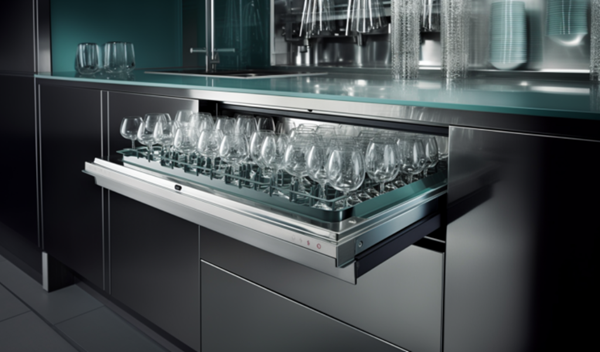Advancements in commercial undercounter glasswashers in Sydney have brought about innovative features and technology that have revolutionized the glassware cleaning process. These advancements have significantly improved cleaning performance, efficiency, and sustainability. Let's explore some of the key innovations and future trends in commercial undercounter glasswashers:
Smart Control Systems: The integration of smart control systems into undercounter glasswashers allows for enhanced monitoring, diagnostics, and automation. These systems can provide real-time data on water temperature, usage, cycle times, and maintenance requirements. Remote access and control features enable operators to monitor and manage multiple machines from a centralized location, optimizing workflow and efficiency.
Energy Efficiency: Manufacturers are prioritizing energy efficiency in the design of undercounter glasswashers. Advanced heating elements, improved insulation, and optimized water circulation systems help minimize energy consumption without compromising cleaning performance. Energy-saving features such as low-power standby modes and sensors that activate the machine only when glassware is detected further contribute to energy efficiency.
Water Conservation: With a focus on sustainability, undercounter glasswashers now incorporate water-saving technologies. These include advanced spray arm designs, precise water jets, and optimized water flow control systems. By reducing water consumption without compromising cleanliness, these innovations contribute to environmental conservation and cost savings for businesses.
Touchless Operation: Touchless technology, such as infrared sensors, is being incorporated into undercounter glasswashers. This allows for hands-free operation, improving hygiene and reducing the risk of cross-contamination. The sensors detect glassware presence and automatically initiate the cleaning cycle, eliminating the need for manual activation.
Improved Drying Systems: Advanced drying systems, such as forced hot air or compressed air, are becoming more prevalent in undercounter glasswashers. These systems accelerate the drying process, ensuring faster evaporation of water droplets and minimizing water spots or streaks on glassware. Efficient drying also reduces the need for manual drying, saving time and labor.
Customizable Wash Programs: Undercounter glasswashers now offer a range of customizable wash programs to accommodate different types of glassware and cleaning requirements. These programs allow operators to adjust factors such as water temperature, pressure, cycle duration, and detergent dosing, ensuring optimal cleaning performance for specific glassware items.
Enhanced Safety Features: Safety features have been improved in undercounter glasswashers to protect operators and prevent accidents. These features include automatic door locks during operation, heat-resistant exterior surfaces, and mechanisms to prevent machine start-up when not properly closed or secured.
Internet of Things (IoT) Integration: IoT integration is emerging as a future trend in undercounter glasswashers. This connectivity enables data sharing, predictive maintenance, and remote monitoring capabilities. Machine learning algorithms can analyze usage patterns, identify inefficiencies, and provide recommendations for optimized cleaning processes, leading to improved performance and reduced downtime.
Sustainable Chemical Usage: Manufacturers are developing eco-friendly detergents and chemicals specifically formulated for undercounter glasswashers. These products aim to minimize environmental impact while maintaining effective cleaning results. Sustainable chemical usage ensures compliance with green initiatives and promotes safer working environments.
Self-Cleaning Mechanisms: Self-cleaning features are being integrated into undercounter glasswashers to simplify maintenance and reduce manual cleaning tasks. Automatic cleaning cycles, along with specialized cleaning agents, help remove scale, residues, and bacteria that may accumulate within the machine, ensuring optimal performance and hygiene.
Introduction To Smart Features, Such As Automated Wash Cycles And Monitoring Systems
In recent years, smart features have made their way into various household appliances and commercial equipment, including undercounter glasswashers. These smart features have revolutionized the cleaning process by introducing automation, advanced monitoring systems, and enhanced user convenience. In this introduction, we will explore the smart features commonly found in undercounter glasswashers, focusing on automated wash cycles and monitoring systems.
- Automated Wash Cycles: Automated wash cycles in undercounter glasswashers offer a significant advantage by taking the guesswork out of selecting the appropriate cleaning program. These intelligent machines are equipped with sensors and advanced algorithms that detect the type and level of soiling on the glassware. Based on this information, the undercounter glasswasher automatically adjusts crucial parameters such as water temperature, pressure, and cycle duration. This ensures that each load of glassware receives the most suitable and efficient cleaning treatment without manual intervention. Automated wash cycles save time, eliminate the possibility of human error, and deliver consistently excellent cleaning results.
- Monitoring Systems: Monitoring systems integrated into smart undercounter glasswashers provide real-time insights into machine performance and operational status. Through an intuitive interface, operators can access information such as current cycle progress, temperature levels, water usage, and error notifications. This enables efficient workflow management and allows operators to address any issues promptly. Additionally, some monitoring systems offer remote access capabilities, allowing users to monitor and control the glasswasher from a mobile device or computer. Remote access enhances convenience, enabling off-site monitoring and control, facilitating troubleshooting, and providing peace of mind.
- Benefits of Smart Features: The introduction of smart features in undercounter glasswashers brings several benefits to both commercial establishments and users.
- Firstly, automated wash cycles ensure optimal cleaning performance with minimal effort. By automatically adjusting key parameters, the undercounter glasswasher optimizes resource usage, such as water and energy, resulting in cost savings and reduced environmental impact. Additionally, automated cycles deliver consistent cleaning results, eliminating variations caused by human factors and enhancing customer satisfaction.
- Secondly, monitoring systems provide valuable insights and facilitate proactive maintenance. Operators can monitor machine performance, detect potential issues, and address them before they escalate. This helps prevent downtime, increases machine longevity, and ensures uninterrupted glassware cleaning operations.
- Lastly, the convenience offered by smart features simplifies operation and reduces the learning curve. Intuitive interfaces and touch controls make it easy for operators to navigate through various options and customize settings according to their preferences. The automation and monitoring capabilities of smart undercounter glasswashers save time, allowing staff to focus on other essential tasks.


Find the right Commercial Undercounter Glasswasher
Compare quotes from expert Australian suppliers and make the best choice. It's free, quick and easy!
Analysis Of Emerging Trends In Glassware Cleaning Techniques And Equipment Automation
Emerging trends in glassware cleaning techniques and equipment automation are shaping the future of the industry, bringing advancements that improve efficiency, cleanliness, and user experience. Let's analyze some of these trends:
- Ultrasonic Cleaning: Ultrasonic cleaning is gaining popularity as a highly effective and efficient method for cleaning glassware. This technique utilizes high-frequency sound waves to create microscopic bubbles in a cleaning solution. The bubbles implode near the glass surface, generating tiny scrubbing actions that remove dirt, stains, and residues from even hard-to-reach areas. Ultrasonic cleaning offers superior cleaning performance, reduces manual labour, and ensures consistent results.
- Robotics and Automation: Automation is transforming the glassware cleaning process. Robotic systems equipped with advanced sensors and machine learning algorithms can handle tasks such as sorting, loading, and unloading glassware. These systems optimize cycle times, minimize breakage risks, and increase overall efficiency. Automation streamlines workflow, reduces labor costs, and enhances operational productivity.
- Waterless Cleaning Technologies: Waterless cleaning technologies are emerging as sustainable alternatives to traditional water-based methods. These techniques use specialized cleaning agents, such as foam or spray, to remove stains and residues from glassware without the need for excessive water usage. Waterless cleaning technologies save water, reduce wastewater generation, and offer flexibility in environments where water availability is limited.
- Non-Contact Cleaning: Non-contact cleaning methods, such as plasma cleaning or laser cleaning, are gaining traction for delicate and sensitive glassware. These techniques use energy sources like plasma or laser beams to remove contaminants without physical contact. Non-contact cleaning eliminates the risk of scratching or damaging glassware, making it suitable for fragile items and intricate designs.
- IoT Integration and Connectivity: The integration of Internet of Things (IoT) technology enables connectivity, data monitoring, and remote control of glassware cleaning equipment. IoT-enabled glassware cleaning systems can collect real-time data on cleaning performance, energy usage, and maintenance needs. This data helps optimize cleaning processes, predict maintenance requirements, and enhance operational efficiency.
- Sensor Technology: Advanced sensors are revolutionizing glassware cleaning by providing precise monitoring and control. Sensors can detect factors like water temperature, pressure, and detergent concentration, allowing for automated adjustments to optimize cleaning performance. Additionally, sensors can identify issues or anomalies in the cleaning process, enabling prompt troubleshooting and maintenance.
- Artificial Intelligence and Machine Learning: Artificial intelligence (AI) and machine learning algorithms are being employed to analyze data collected during the cleaning process. AI algorithms can identify patterns, optimize cleaning parameters, and predict maintenance needs. By continuously learning and adapting, these systems improve efficiency, reduce errors, and ensure consistent cleaning results.
- Sustainable and Eco-Friendly Practices: There is a growing emphasis on sustainable and eco-friendly practices in glassware cleaning. Manufacturers are developing biodegradable detergents, incorporating energy-saving features, and implementing water-conserving technologies. These sustainable practices reduce environmental impact, promote responsible resource usage, and align with eco-conscious consumer demands.
The advancements in commercial undercounter glasswashers, the integration of smart features such as automated wash cycles and monitoring systems, and the emergence of trends in glassware cleaning techniques and equipment automation have paved the way for a new era of efficiency and sustainability in the industry. With smart control systems, operators can easily monitor and manage multiple machines, optimizing workflow and resource usage. Energy-efficient designs and water-saving technologies contribute to reduced environmental impact and cost savings. The introduction of automated wash cycles ensures consistent and optimal cleaning results, while monitoring systems provide real-time insights for proactive maintenance. The analysis of emerging trends, such as ultrasonic cleaning, robotics, and non-contact cleaning, showcases the industry's commitment to innovation and improving cleanliness. IoT integration, sensor technology, and AI algorithms enable intelligent data analysis and optimization, leading to enhanced operational efficiency. With a focus on sustainable and eco-friendly practices, the industry strives to reduce its environmental footprint while delivering exceptional cleaning performance. As these advancements and trends continue to evolve, the future of glassware cleaning looks promising, with continued advancements in efficiency, automation, and sustainability.



-205x205.png)


